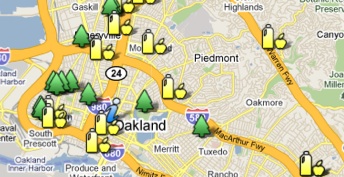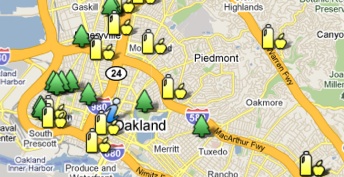Shareable contributor Emilie Raguso has created a wonderful resource for the residents of Oakland, California–a food map.
Oakland has many neighborhoods where social action has improved food access, in West Oakland in particular. But many people continue to live in areas that qualify as food deserts, where there are no outlets to purchase healthy food within walking distance. Even more, lack awareness of food justice as an organizing issue, and of food distribution networks, community gardens and urban food co-ops and farmers markets as ways to start to address these issues. Use our map to find resources–but also to note where they are lacking.
You can view the large Google map here. On the hyper-local Oakland Local site, which published Emilie’s food map, Sierra Filucci provides an overview of hunger in the area:
Less work means more hunger. Oakland’s nearly 17% unemployment rate (close to twice the national rate) means that in our city, right now, many people don’t have enough to eat. And in outlying towns like Fremont and Hayward, the problem is even more severe.
Recently the USDA reported that in 2008 nearly 15 million US households were “food insecure” — which means a member of the household did not have access to adequate and nutritious food at some point during the year. The number of people seeking free food from American food banks and food pantries is the highest recorded since USDA began collecting this information in 1995.
But Fillucci reports that Oakland residents are responding at a grassroots level:
Aside from those working on food distribution, Oakland has a rather large number of organizations working against hunger and food insecurity from a different angle.
“We’re looking at ways to bring fresh, healthy, affordable, local food to Oakland’s low income neighborhoods,” says Hank Herrera, a local food justice advocate.
His vision, shared by grassroots organizations like City Slicker Farms, Soul Food Farms, Mandela Cooperative, Planting Justice and others operate with a goal of setting up systems in underserved neighborhoods that follow more of a self-sufficiency approach.
“It’s about insuring that people have the resources and the means to create access for themselves for the foods that they want,” he says.
Great job, Oakland Local.










